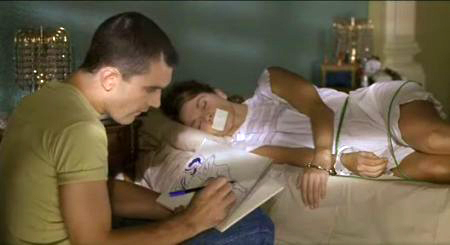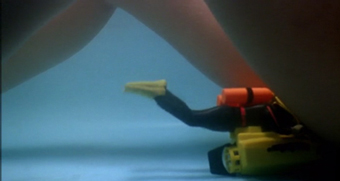Reviewed by Glenn Erickson
Pedro Almodóvar is often compared to fellow Spaniard Luis Buñuel, when their outlooks are really very different. The director of Un chien Andalou and Los olvidados has little use for human warmth, whereas Almodóvar genuinely adores the sexually confused misfits that populate his colorful, richly conceived comedies. Pedro exhibits a deep affection for life and people -- no matter what their modern malfunctions -- that would not interest his surrealist predecessor.
After a series of twisted black comedies, Almodóvar scored an international hit with his 1988 Mujeres en el borde de un ataque de nervios (Women on the Verge of a Nervous Breakdown). The unpredictable romantic farce earned a delightful best Foreign Film Oscar nomination for the extremely talented guíon. Mujeres was something of a departure for Almodóvar. His earlier pictures had featured bizarre sexual relationships, gore and other extreme content then considered too rough or vulgar for mainstream America.

The delightfully comic Tie Me Up! Tie Me Down! (Átame!) sees Pedro Almodóvar once again unfettered by standard romantic conventions. This time the subject is kidnapping and rape, with no allowance for politically correct sensibilities. In the U.S. the show was slapped with an NC-17 rating.
Spain appears to be the world capitol of delirious desire. An asylum directress (Lola Cardona) is forced to release young inmate Ricky (Antonio Banderas), her secret lover. On a previous escape from the loony bin, Ricky met and briefly bedded Espejo's star Marina (Victoria Abril), a former porn actress recovering from drug addiction. Ricky now beelines it to the set of her new movie Midnight Phantom, a horror opus about a woman threatened by a hideously mutilated masked muscleman. She's also pursued by the director, a wheelchair-bound, cheerfully lecherous Maximo Espejo (Francisco Rabal of Sorcerer). Convinced that they are romantically fated to be together forever, Ricky imprisons Marina in her apartment and sets out to prove that his love transcends simple fan adoration. His plan for romantic success requires bondage but also tender loving care. Marina hasn't exactly had a normal life, and this outrage is the strangest experience yet.

The Spanish title Átame! does literally mean, "Tie me up!" and some critics have never warmed to Almodóvar's sense of fun. Tie Me Up! Tie Me Down! was met in some quarters by accusations of misogyny and sexism. In PC terms Marina's kidnapping is a capital crime and his 'nice' imprisonment of her an abomination, and any other representation is unacceptable. Ricky even knocks Marina out cold, "because he has to". But Almodóvar's movie isn't an exploitative bondage fantasy, and in fact offers sensible observations about human relationships. His confused lovers can be crooks, perverts, or hopeless romantics; his outlook on sexual preference makes no distinctions.
Ricky's plan is that, if he can just force Marina to live with him for a few days she'll have to fall in love with him. That's how romances work, Ricky reasons, and it's not his fault if getting close to her in any conventional way is impossible. In real life terms Ricky is a stalker and a kidnapper, but this isn't reality. Almodóvar's overarching theme is the irrationality of desire, an imperative that frequently makes its own rules. Ricky and Marina aren't offered as role models but as a kooky case study in amour fou - "amor loco".
Pedro Almodóvar understands and respects women. This particular female is confused, disordered and irresponsible yet possesses the stamina and adaptability seen in all Almodóvar heroines. Marina's terror in captivity does indeed turn into something else the more time she shares with Ricky. He does not rape her, and in fact treats her with more honest affection and concern than she's ever known. He goes shopping for the most comfortable rope and tape he can find. A girl from the country, Marina loves dumb animals. Her caring instincts and subsequent affection is set off when Ricky comes back injured, after trying to buy some pills for her broken tooth.

This is normally subject matter for a horror film like Máximo Espejo's Midnight Phantom. William Wyler's 'respectable' drama The Collector spends two hours spinning its wheels in psychological complexity, while its viewers are naturally thinking along more exploitative lines. The less repressed Átame! goes right to the heart of the matter, and with a gentle sense of humor, too. Almodóvar's rape fantasy could be called "Desire Unchained".
Marina has barely kicked her heroin habit, and her loving sister Lola (Loles León) tries to look after her. Lola is also the production manager for Máximo Espejo's horror film. Most Almodóvar movies incorporate references to movies. In Tie Me Up! Tie Me Down! the Euro-horror director is a profane nut sexually obsessed with his sexy actresses. We see a hilarious moment from Espejo's La fantasma de la medianoche, with a masked muscleman professing his love for his imprisoned victim. Marina's fearful, staring eyes fit right into the horror tradition. But true to the director's championing of heroic women, Marina breaks with generic formula and fights back, turning the tables on the phantom monster. Marina similarly attacks Ricky, cutting his face.
In a nice touch, the actor playing the Phantom re-encounters a woman he dated sometime in the past. She's clearly still interested, even if his gory monster makeup is a distraction. This also is a comical comment on the Ricky-Marina relationship. 1

The movie is funny, well acted, and bizarre as only an Almodóvar film can be, a delight for fans seeking something both spicy and insightful about how couples relate, outside of political ideologies. The supporting cast is packed with the director's favorites. Loles León has a delightful musical number; she played the telephone receptionist in Women on the Verge. Rossy de Palma, that woman with the fascinating Picasso face, is a drug deler on a scooter. The director's mother makes another welcome appearance, playing Marina's mom on a telephone call.
At the center of Almodóvar's philosophy is that the Spanish character is illogical (and perhaps primitive) because its foundation is Desire. This idea is emphasized in a hilarious ersatz TV commercial that explains why Spain is overrun by retired German tourists. Hot-blooded Spaniards loll away their lives dancing the tango and making love -- but a hardworking Nazi couple (both uniformed and wearing swastikas!) have saved for their retirement years.

Does Tie Me Up! Tie Me Down! really deserve its NC-17 rating? There's a fairly exciting sex encounter, some fleeing nudity and a cute kinky scene in which Marina plays in the bathtub with a little frogman toy - a slightly surreal fantasy that would be realized in a more graphic manner in the director's Talk to Her (2002). Some of the Los Angeles movie patrons I saw the movie with complained loudly that the film wasn't sexy enough. In 1990 NC-17 meant smut and explicit sex, and the weirdest thing we get here is a cute windup bath toy paddling its way between Victoria Abril's parting legs. 2
At the center of Almodóvar's philosophy is that the Spanish character is illogical (and perhaps primitive) because its foundation is Desire. This idea is emphasized in a hilarious ersatz TV commercial that explains why Spain is overrun by retired German tourists. Hot-blooded Spaniards loll away their lives dancing the tango and making love -- but a hardworking Nazi couple (both uniformed and wearing swastikas!) have saved for their retirement years. That's our Pedro!
The Criterion Collection's Dual-Format Blu-ray + DVD of Tie Me Up! Tie Me Down! is a flawless transfer of this sweet & eccentric erotic comedy. José Luis Alcaine's colorful cinematography of Esther García and Ferran Sánchez's sets and costumes is dazzling. Composer Ennio Morricone contributes a playful music score, with a very nice main theme.
Disc producer Susan Arosteguy has put together several new extras. A comprehensive making-of documentary includes the input of the director, his producer brother, four of the main stars and the cinematographer. Another interview features a Sony executive. We're given a 2003 video conversation between Almodóvar and Antonio Banderas, and video coverage of the film's 1990 Madrid premiere.
On a scale of Excellent, Good, Fair, and Poor,
Tie Me Up! Tie Me Down! Blu-ray + DVD
rates:
Movie: Excellent
Video: Excellent
Sound: Excellent
Supplements: New making-of documentary, interview with Sony Pictures Classics executive Michael Barker; conversation from 2003 between the director and Banderas; footage from the 1990 premiere party in Madrid; insert booklet with an Almodóvar essay and a 1989 text interview; plus a conversation between critic Kent Jones and filmmaker Wes Anderson.
Deaf and Hearing-impaired Friendly?
YES; Subtitles: English
Packaging: Keep case
Reviewed: August 9, 2014
Footnotes:
1. Another salted comparison to the Ricky-Marina romance: a movie poster is only half-seen at the entrance to Marina's neighbor's apartment. It's for Jean Cocteau's L'aigle à deux têtes. Its IMDB summary reads, "Azrael, a suicidal anarchist, enters the Queen's private quarters intent on killing her, and then killing himself. But they instead fall in love."
The return home at the end of the movie, with Ricky in the abandoned ruins of his house, reminds us a bit of Buñuel's Las Hurdes. The happy reunion in a ruin that looks like a castle tower is more than a little like the finale of I Know Where I'm Going! -- another slightly fantastic romance whose heroine 'surrenders' to male desire.
Return
2. The estimable "B" writes in with a highly informative note. There's a lot here about the history of the ratings system that I didn't know:
Dear Glenn: Nice review of a funny non-PC Almodóvar movie. A brief comment, though...
You wrote, Does Tie Me Up! Tie Me Down! really deserve its NC-17 rating? ...In 1990 NC-17 meant smut and explicit sex, and the weirdest thing we get here is a cute windup bath toy paddling its way between Victoria Abril's parting legs.
Some audiences of 1990 thought the film wasn't rough enough to earn its NC-17 rating, but who cares about them?
While I take your point about all of this, I guess I can't let it rest; the ratings situation involving Tie Me Up! Tie Me Down! was somewhat more complicated than you suggest here.
To begin with, the Almodóvar film actually received an "X" rating from CARA when Miramax submitted it in the early spring of 1990. The ever contentious Weinstein brothers -- who a bit earlier had submitted Peter Greenaway's The Cook, The Thief, His Wife and Her Lover, received (an inevitable) X rating, and simply decided to distribute that film unrated -- took considerable umbrage over Almodóvar's little movie being tabbed with such a restrictive rating. As I recall, Miramax immediately appealed the rating. When CARA reaffirmed the X, the Weinsteins sued the MPAA. Loudly, so the neighbors could hear. This got a lot of publicity; I don't think anyone had seriously (or as determinedly) sued over a rating in quite a while. The MPAA & CARA prevailed, to be sure, and the Weinsteins ultimately released Tie Me Up! Tie Me Down! without a rating.
Though the MPAA had won the suit, the Weinsteins had publicly reopened the unwieldy can of worms regarding Art, Commerce and Adult Material in movies that had never satisfactorily been addressed or resolved in twenty-odd years. The foolish decision of the MPAA to not copyright the X rating back in 1968 -- and its consequent rampant use as a lurid signifier by producers of pornography -- really did haunt Jack Valenti to the end of his life. It was clear that this was going to come to a head sooner or later, and something would have to be done. In late summer, as Universal (of all studios) readied Phil Kaufman's arty, very adult-themed Henry and June for release, CARA rated the picture X. This was a problem. Universal actually had a corporate policy that it would not release X-rated pictures (though the studio had produced and released a few such films in the early days of the ratings code, problems with ads and distribution had resulted in the policy), and Kaufman's final cut rights only extended to delivering an R-rated movie. There was a good deal of publicity, and a great deal of conversation. After a few weeks, the MPAA and CARA eventually announced a new rating to replace the X: the NC-17. This was extremely similar to the X rating, but it was a) copyrighted by the MPAA and could not be self-imposed by filmmakers and b) ...well, all right, an "adult" rating, but not an X rating.
In other words, in 1990 anyway, the idea was, an NC-17 wasn't supposed to connote "smut and explicit sex."
Valenti, bless him, said "We are going back to the original intent of the rating system." It was supposed to be the thinking person's X rating -- the socially acceptable X, the arthouse X, an X for the people... I dunno.
Universal was satisfied, anyway, and Kaufman's Henry and June was launched in October with the brand new rating.
As we of course know, this ultimately didn't really work out very well. The mall theaters that hadn't wanted any part of X-rated films decided they didn't want any part of NC-17-rated movies either (in numerous cases, mall operators actually added this to contracts and leases); some papers still were wary of ads for any "adult" pictures at all. The NC-17 turned out to be practically the same kind of signifier as the X.
Both Tie Me Down and The Cook, The Thief (where is this film lately?) bear NC-17 ratings now. As does Beyond the Valley of the Dolls, for that matter. And Bertolucci's Last Tango in Paris (beware the R-rated version occasionally screened), The Dreamers (but not 1900, which surrendered its rating, and is now unrated). Tropic of Cancer. Inserts. Showgirls.
Yeah, I know -- it wasn't worth all that prose. [Glenn: I strongly disagree.] I hope your vacation is still swell -- you deserve it. Best, Always. -- B.
Return

Text © Copyright 2014 Glenn Erickson
See more exclusive reviews on the Savant Main Page.
The version of this review on the Savant main site has additional images, footnotes and credits information, and may be updated and annotated with reader input and graphics.
Return to Top of Page
|

